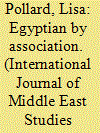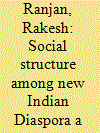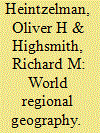|
|
|
Sort Order |
|
|
|
Items / Page
|
|
|
|
|
|
|
| Srl | Item |
| 1 |
ID:
046796


|
|
|
|
|
| Publication |
New Brunswick, Transaction Publishers, 2002.
|
| Description |
xviii, 259p.
|
| Contents |
Vol. 10: Advances in criminological theory
|
| Standard Number |
0765800640
|
|
|
|
|
|
|
|
|
|
|
|
Copies: C:1/I:0,R:0,Q:0
Circulation
| Accession# | Call# | Current Location | Status | Policy | Location |
| 045509 | 364/WAR 045509 | Main | On Shelf | General | |
|
|
|
|
| 2 |
ID:
131560


|
|
|
|
|
| Publication |
2014.
|
| Summary/Abstract |
In this article I argue that the Egyptian state emerged as a welfare provider in the mid-20th century, first by depending on the services of charitable societies to feed, educate, and provide medical assistance to the poor, and later by imitating and harnessing the activities of charitable societies. Drawing on correspondence between the state and service societies from the 1880s to 1945, when King Faruq (r. 1936-52) granted the Egyptian Ministry of Social Affairs (MOSA) the authority to define and to circumscribe the activities of social welfare organizations, the article illustrates the interactions of and the similarities between private and state-sponsored charity. The article further suggests that the establishment of MOSA helped to consolidate the hegemony of the Egyptian state over society and, at the same time, exemplified a dialectical process of state formation engaged in by Egyptian heads of state, service organizations, and the Egyptians whose needs they served.
|
|
|
|
|
|
|
|
|
|
|
|
|
|
|
|
| 3 |
ID:
132669


|
|
|
|
|
| Publication |
2014.
|
| Summary/Abstract |
Local citizen-led initiatives relating to energy are developing strongly in Anglo-Saxon countries and a growing body of research is examining their innovative potential. In France, similar grassroots initiatives - albeit with certain specificities - only began to emerge recently and so far, very few studies have dealt with them. The purpose of this article is to propose an exploratory and in-depth analysis of one advanced French case: Le Mené, a pioneer in local energy autonomy. We examine the conditions under which the initiative emerged and the processes through which a grassroots innovation is formed. In studying this case (interviews, analysis of documents), comparing it with other sources of data (expert interviews, comparative observation of other initiatives) and taking stock of various social sciences studies, we show that a social innovation was produced in Le Mené through the hybridisation of actors, sociotechniques and discourses. This initiative was innovative not only in terms of the scope of the mechanisms implemented, but also in terms of the social organisation behind the development of the projects and the capacity to use energy production as a social resource. Finally, we reflect on the possible diffusion of these grassroots initiatives and their policy implications in France.
|
|
|
|
|
|
|
|
|
|
|
|
|
|
|
|
| 4 |
ID:
116246


|
|
|
|
|
| Publication |
2012.
|
| Summary/Abstract |
Social structural methods are applied to forecast the political economy of the inner solar system to the 22nd century. One method considers structural indicators, specifically, population, social organization, environment, and technology. Another method examines the Tongan diaspora as an analog of human expansion into space. This future political economy could emerge as a consequence of user strain on a global electrical power grid that develops by 2050. Alternative energy needs could turn to space-based sources. If on-orbit space-based energy infrastructure provides the rationale, capability, and allure to see humans routinely living and working in space, their presence on the Moon and among the near-Earth asteroids can lead to a human diaspora to Mars and its moons. These events will build the multi-planet economy, the multi-world system of societies, and the transnational state. The development of Mars will reach a maturity of settlement from 2130 onward. As these potential events become history, capital would be transformed, and higher-order space logistics in a multi-world system of societies with its multi-planet economy would lay the foundation for a Solar System Federation. This federation constitutes transnational states among off-world human societies that could fill the vacuum of a fading Westphalian nation-state system on Earth.
|
|
|
|
|
|
|
|
|
|
|
|
|
|
|
|
| 5 |
ID:
143671


|
|
|
|
|
| Summary/Abstract |
S. M. Shirokogoroff’s book Social Organization of the Northern Tungus was originally published in 1929 in English and later also in Chinese and Japanese languages. It is striking that this monograph has still not been published in Russian. It contains rich ethnographic data on Evenki kin relations, family organization, property relations, and various customs regulating social life. This text demonstrates how ethnographic data are translated into a theory. Compared to the Russian texts of the same period, S. M. Shirokogoroff’s writings were free from Soviet ideological frames. This article discusses the historical and ideological contexts, in which Alexsandr Nikolaevich Gorlin (1878–1939), a literary translator, worked on the Russian translation of S. M. Shirokogoroff’s book in the 1930s, as well as the challenges that the contemporary readers and academic editors of the translation face. It shows that the translation process itself and translation versions are intriguing objects of anthropological research, as they illustrate the temporal dimension of the academic language and facilitate our understanding and interpretation of diverse processes that molded the indigenous peoples’ image in the early Soviet science.
|
|
|
|
|
|
|
|
|
|
|
|
|
|
|
|
| 6 |
ID:
128147


|
|
|
|
|
| Publication |
2014.
|
| Summary/Abstract |
A diaspora exists precisely because it remembers the 'homeland' without this memory this migrants and settlers would be simply people in a new setting, into which they merge, bringing little or nothing to the new home, accepting in various way and forms the mores and attitudes that already exists in their new country and society … The people of the Diaspora, however do not merely settle in new countries: they recreate in their socio-economic, political and cultural institutions a version of that homeland that they remember. (Reeves and Rai 2006: 17).
|
|
|
|
|
|
|
|
|
|
|
|
|
|
|
|
| 7 |
ID:
026452


|
|
|
|
|
| Edition |
4th ed.
|
| Publication |
New Jersey, Prentice-Hall, Inc., 1973.
|
| Description |
xi, 432p.Hbk
|
| Standard Number |
0139690069
|
|
|
|
|
|
|
|
|
|
|
|
Copies: C:1/I:0,R:0,Q:0
Circulation
| Accession# | Call# | Current Location | Status | Policy | Location |
| 011536 | 910.02/HEI 011536 | Main | On Shelf | General | |
|
|
|
|
|
|
|
|
|